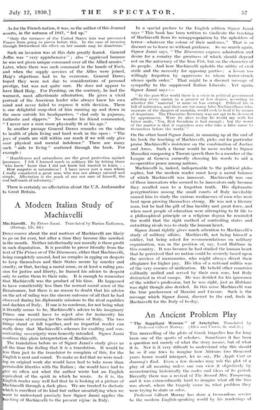A Modern Italian Study of Machiavelli
Machiavelli. By Ettore Janni. Translated by Marion Enthoven. (Harrap, 12s. 6d.) DISCUSSIONS about the real motives of Machiavelli are likely to go on for ever, but after a time they become like sawdust in the mouth. Neither intellectually nor morally is there profit in such disputation. It is possible to prove literally from the text of The Prince or of The Discourses, either that Machiavelli, being completely amoral, had no scruples in egging on despots to keep themselves and their States secure by murder and cruelty, or that, having a moral sense, or at least a ruling pas- sion for justice and liberty, he framed his advice to despots only to entice them to their ruin. It is enough to remember that Machiavelli was the product of his time. He happened to have considerably less than the normal moral sense of the Renaissance, but there is no reason to doubt that his advice on the art of ruling was the sincere outcome of all that he had observed during his diplomatic missions to the rival republics and duchies of Italy. If one is to condemn, for not being what it literally seems to be, Machiavelli's advice to his imaginary Prince one would have to reject also for insincerity his expressions of yearning for the unification of Italy. The two things stand or fall together, and no impartial reader can really deny that Machiavelli's schemes for exalting and con- centrating sovereignty were honestly intended. Signor Janni confirms this plain interpretation of Machiavelli.
The translation before us of Signor Jannrs study gives us all the time the feeling that it is a translation. It would be ss than just to the translator to complain of this, for the nglish is neat and sound. To snake us feel that we were read- ng an original work she would have had to take more than errnissible liberties with the Italian ; she would have had to ye us often not what the author wrote but an English univalent of the spirit in which he wrote. As it is, the nglish reader may well feel that he is looking at a picture of fachiavelli through a dark glass. We are treated to rhetoric Welt is excellent of its kind but rather unsatisfying when we ant to understand precisely how Signor Janni applies the aching of Machiavelli to the present regime in Italy. In a special preface to the English edition Signor Janni says " This book has been written to vindicate the teaching of Machiavelli from its misappropriation by the upholders of terror—whatever the colour of their uniforms." That is so discreet as to leave us without guidance. So we search again. Signor Janni says, " The Discourses express admiration and desire for a country the greatness of which should depend not on the autocracy of the Iron Fist, but on the character of its people. And here Machiavelli upholds the utility of civil strife and the necessity for opposing parties ; a lesson too willingly forgotten by oppressors to whom terror-struck silence spells order." That might be a discreet message of sympathy to the suppressed Italian Liberals. Yet again, Signor Janni says :— " In the post-War world there is a crisis in political government afflicting every nation in a greater or less degree, according to whether the ' material ' is more or less corrupt.. Political lifo is full of infirmities, and there are too many false Machiavellians Who, nnaware of the dangers of morphia, would seek to heal it by means of despotism. The Florentine Secretary was not apt to be deceived by appearances. Were he alive to-day he would say with his bitter smile, Yes, Red Socialism is bad enough ; but the worst of the matter is that it engenders sons who take a false name to themselves before the world.'"
On the other hand Signor Janni, in summing up at the end of his book the teaching of Machiavelli, picks out for particular praise Machiavelli's insistence on the combination of Justice and Arms. Such a theme would be snore useful to Signor Mussolini composing a Tuscan speech than to a member of the League at Geneva earnestly choosing his words to aid a co-operative peace among nations.
Machiavelli is, indeed, indispensable to the political philo- sopher, but the modern reader must keep a moral balance of which Machiavelli was innocent. Machiavelli was one of those innovators who seemed to be innovators only became they recalled men to a forgotten truth. His diplomatic peregrinations among the small courts of Italy inevitably caused him to study the various weaknesses of men who were bent upon proving themselves strong. He was not a literary man, but he had the gift of fine lucidity and great force, and when most people of education were attempting to fit life to a philosophical principle or a religious dogma he reminded the world that the right method of controlling states and outwitting rivals was to study the human heart.
Signor Janni rightly gives niuch attention to Machiavelli's study of military affairs. Machiavelli, not being himself a soldier, but being asked for recommendations on military organization, was in the position of, say, Lord Haldane in this country. It was because he had studied the human heart that he perceived that no nation could be securely based upon the services of mercenaries, who might always divert their allegiance for higher pay. His idea of a national militia was of the very essence of unification. Ile beheld other countries militarily unified and served by their own sons, but Italy distracted in rival camps. He was derided for his ignorance of the soldier's profession, but Ise was right, just as Haldane was right though also derided. In this sense Machiavelli was the true predecessor of Mazzini and Cavour. Such is the message which Signor Janni, discreet to the end, finds in Machiavelli for the Italy of to-day.




































 Previous page
Previous page